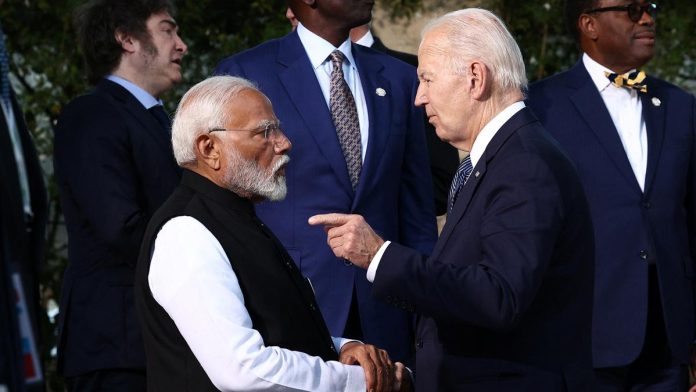New Delhi, June 27: Prime Minister Narendra Modi’s recent electoral setbacks in the 2024 Lok Sabha polls and the BJP’s need to rely on coalition partners to continue for the third consecutive term will likely impact India’s regional policies, prompting neighboring countries to adopt a more cautious approach, according to a report by the United States Institute of Peace (USIP).
Following the swearing-in of Modi and the newly elected Members of Parliament in the 18th Lok Sabha, the USIP released a report analyzing reactions from India’s neighbors and their strategies for engaging with the new government. The report, authored by experts including Ambassador Humayun Kabir and USIP’s Geoffrey Macdonald, Nilanthi Samaranayake, and Asfandyar Mir, examines the perspectives of Bangladesh, Pakistan, the Maldives, and Sri Lanka.
Bangladesh: Balancing Act Between India and China
Bangladesh, under Prime Minister Sheikh Hasina, has maintained a productive relationship with Modi’s BJP government despite controversial rhetoric and actions toward Muslims. With Modi’s third term, regional geopolitical competition between India and China is expected to intensify, raising the stakes for bilateral relations. Hasina’s recent visit to Delhi underscored the importance of the relationship, with agreements to enhance cooperation in defense, maritime security, and other areas. However, ordinary Bangladeshis’ resentment toward India’s perceived dominance may complicate relations.
Maldives: A Reset in Relations
The Maldives, under President Mohamed Muizzu, has seen a reset in relations with India. Despite previous controversies, Muizzu’s attendance at Modi’s swearing-in and positive interactions with Indian officials indicate a healthy reset. The completion of India’s military withdrawal from the Maldives, a key campaign promise of Muizzu, has paved the way for continued cooperation on infrastructure and debt repayment.
Sri Lanka: Navigating Uncertainty
Sri Lankan President Ranil Wickremesinghe’s attendance at Modi’s inauguration comes ahead of an uncertain presidential election later this year. India’s External Affairs Minister S. Jaishankar’s visit to Sri Lanka highlighted areas of cooperation, but the issue of Chinese research vessels visiting Sri Lankan ports remains a strategic challenge.
Pakistan: Skepticism and Limited Diplomacy
Pakistani leaders were likely surprised by the BJP’s reduced vote share and coalition rule, but they do not expect significant changes in India’s policy toward Pakistan. Skepticism prevails, with expectations of continued disengagement and a potentially more belligerent stance from India. Pakistani Prime Minister Shehbaz Sharif’s tepid congratulatory message to Modi contrasts with the warmer statement from former Prime Minister Nawaz Sharif, reflecting differing views on the potential for improved relations.
Under these circumstances, the USIP report highlights the complex dynamics of India’s regional relationships in the wake of Modi’s electoral setbacks. Neighboring countries are recalibrating their strategies, balancing domestic and international pressures, and navigating the evolving geopolitical landscape. The USIP continues to focus on conflict areas that impact U.S. national security interests, working towards a more peaceful and inclusive world.




